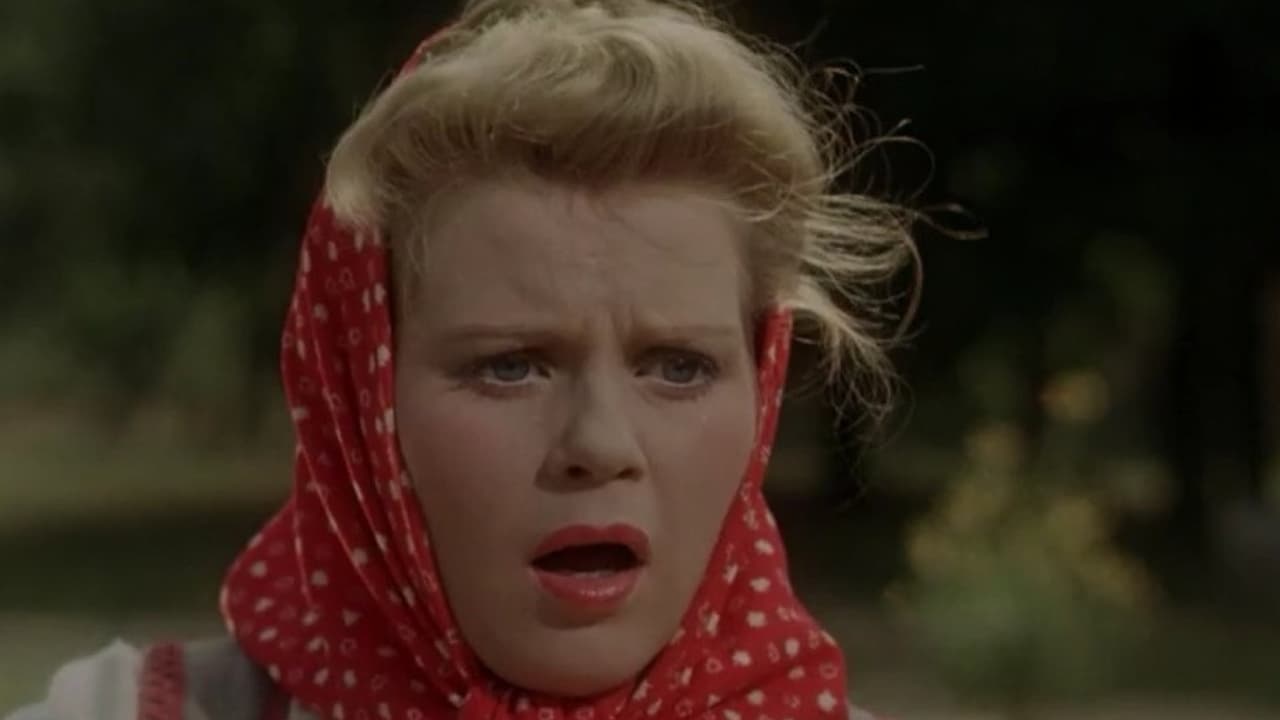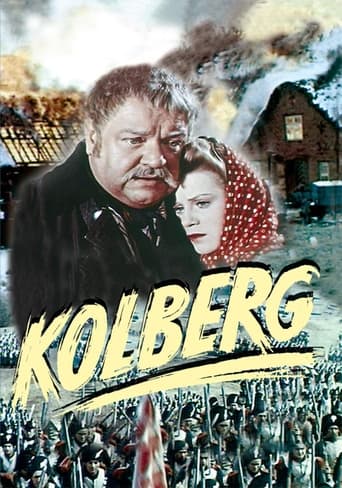

"Kolberg" is a German film from 1945 by the infamous writer and director Veit Harlan and even if Germany had already lost the war at this point, the film industry had not yet understood that the fight was lost. The core message of this Nazi German propaganda is that they are telling the German population to hang in because no matter how hopeless and bad the situation seems, there is always the possibility to turn the tables. The core hatred in here is not against Jews anymore as in many other propaganda films, but it is the French guys getting their fair share this time. It plays during the days of Napoleon and he is also one of the main characters in here, the main antagonist as we watch the (likeable) Prussian forces desperately and bravely fight the evil French forces. In order to include an emotional impact, Heinrich George's and Kristina Söderbaum's characters were included. They do not necessarily have a whole lot to do with the military battle, but they are inevitably confronted with it. And the ending of course, in old Nazi manner, shows that all the dying, all the sacrifice and all the losses were worth it and had to happen in order to gain victory. Well.. I must say there were a couple solid moments in terms of story-telling, more than usual for a Harlan film, but overall it was not enough for a 100-minute movie I must say. The message to hang in is worth discussing if it is really that bad to allow people to ban this movie. I don't really think so. But I also do not think that story-telling or acting in here are memorable enough (or memorable at all) to say this film is worth watching. I personally five it a thumbs-down and do not recommend checking it out.
... View MoreDuring the waning years of WWII, it was obvious to just about everyone that ultimately the Germans would lose the war. However, the Minister of Propaganda, Josef Goebbels insisted that a rousing German epic about war MUST be created in order to inspire their people in the defense of the nation. And so, while the country was being incinerated from the air and troops were being slaughtered by the 100s of 1000s on the Eastern Front, HUGE resources were rather inexplicably being diverted to the creation of "Kolberg". 10s of 1000s of soldiers were cast as extras and the great power of the sleeping German movie industry was mustered. And seeing that it was a full-color film with all this money being thrown into it, it's not surprising that this is a great film--though also one most would probably want to forget simply because of who made it and why it was created in the first place.The film is set during the Napoleonic Wars--back around 1807. Town after Prussian town have surrendered to the oncoming French juggernaut. Yet, inexplicably, the town of Kolberg isn't ready to welcome the invaders. Despite a very weak commander of the Prussian army in the region, the Mayor isn't about to surrender and he's encouraging his people to fight to the death, as by slowing down the enemy, ultimate victory may result. But, he must contend with the wimpy commander and send a rather ordinary lady on a mission to have the King replace the commander and support the defense of the city. What follows are some exceptional battle scenes and the only ones which I have seen which are better are from the insanely large Russian version of "War and Peace" (a film you just have to see at least once in your life).Overall, the film is very rousing and inspiring. It's obvious that the purpose of the film is to get the German people to be very willing to lay down their lives as well as convince them that this is not a sacrifice in vain (which is was). As a result, the film probably contributed to the unnecessary deaths of thousands of people--when there was no possible way to stop the inevitable. Plus, unlike the Prussians during the time of Napoleon, they were NOT fighting for what was right. Sad...but amazingly effective...provided the local movie houses had not been blown up so the folks could see it in the first place! By the way, the scene where the peasant girl meets the queen was exceptionally well done--even brilliant. See this and you'll understand what I mean.
... View MoreKolberg is one of those more timeless tales, of a small town besieged by a vast, greedy enemy. It is a story of the small people holding to their honour and duty, and ultimately triumphing over the mighty. The movie is set in the Napoleonic Wars, but the message is for the people of Germany just as they are being invaded by the Red Army and the American and British armies.Goebbels film studios managed to film and distribute this movie just as the final battles of World War II were being fought. Its message of defiant defense in the face of hopeless odds was meant to rally the severely demoralised Germans as their homes were being threatened by the enemy. The songs and vivid colours were meant to entertain and raise morale as life became darker and darker. Technically, its a masterpiece, and makes use of all kinds of modern shots, angles, and special effects. Its colours were terrible, though, but I trust it was the copy I saw. Of course, it might have been a result of the war constraints.Seen in this context, this film is even more interesting than the entertaining story it presents.Jurched
... View MoreKolberg isn't remotely a good movie, but at the same time it's no worse than 99.9 percent of the tripe that is and has always been made by Hollywood. It's hard to objectively discuss this film because of having to precede any actual comments with obligatory expressions of PC horror. But even more so, the quality of the copy in general circulation is so terrible it is difficult to form a fair opinion of how the film does or does not work as a piece of entertainment and or art. The structure of what I saw is so far beyond episodic as to be virtually incomprehensible at times - and I doubt that a film this professional on other levels could ever originally have been so choppy and unclear. It looks to be very heavily edited, with a meat cleaver, by a blind person. Perhaps it was cut to remove as much material as possible that would make the German cause sympathetic, or perhaps just for length (it is still quite a long movie). The color (in the copy I have) is close to indescribable. In fact, when a friend asked me if I saw it in color, it took me a few minutes to think of a way to answer him. It isn't color and it isn't black and white - but it is hideous and must be far, far removed from what Kolberg originally looked like. It's got a cast of thousands, impressive and beautiful (or so it seems through the dim veil of putrid picture quality that I experienced) locations and sets and some good acting, particularly by the patriarchal male lead. The person who plays the Queen of Prussia is outstandingly beautiful. As to 'horrible' 'terrifying' etc., propaganda, Kolberg is much subtler and less specific than the typical exercise for the moron millions churned out by Hollywood such as Casablanca, or any number of movies in which Errol Flynn or Harrison Ford single-handedly-defeats-the (fill in the blank), etc. I find it rather refreshing to get another perspective, as the old one is wearing quite thin these 60 years after 'freedom' supposedly won, and all that. Kolberg's effectiveness as propaganda (the dark days descending over Germany) is interestingly substantiated in the history of genocidal mass rape and murder of Germany civilians in the wake of the Soviet conquest of just the provinces in which Kolberg is set. That the leading actor - an actor, not a politician - was starved to death in a Soviet (you remember the Soviets - our allies in right vs. wrong, freedom vs. slavery World War II?) concentration camp in 1946 certainly gives a certain air of credence to the pronouncements of the film.
... View More